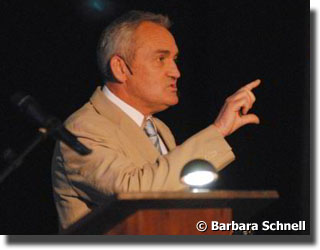2007 Global Dressage Forum
Andrew McLean: "Dressage is a two-way-game"
 After his stint at the 2006 GDF, Animal Behaviorist Andrew McLean returned this year with new findings about the phenomenon called “Learned Helplessness.” In a way, his talk presented a somewhat slippery slope. The mere name “Learned Helplessness” may be standard vocabulary in the world of psychology, but to the average person it is misleading, because the word “learned” usually has a positive connotation. Having learned that “LH” is in no way a positive thing, though, but the ultimate psycho-somatic catastrophe, the audience could immediately lean back again and pat itself on the back because, as the After his stint at the 2006 GDF, Animal Behaviorist Andrew McLean returned this year with new findings about the phenomenon called “Learned Helplessness.” In a way, his talk presented a somewhat slippery slope. The mere name “Learned Helplessness” may be standard vocabulary in the world of psychology, but to the average person it is misleading, because the word “learned” usually has a positive connotation. Having learned that “LH” is in no way a positive thing, though, but the ultimate psycho-somatic catastrophe, the audience could immediately lean back again and pat itself on the back because, as the
GDF sums it up in its own press release, McLean's “conclusion was that this kind of behaviour is not evident in top sport dressage horses.”
How many of them, though, are only one or two steps away from it? Unfortunately, McLean could not provide an answer to that question. Instead he gave a – sadly necessary -- lecture about things that should be common sense to anyone dealing with horses, but that do tend to get lost in every-day haste and ambition.
“The key to dressage training”, says McLean, “is to use minimum pressure to produce maximum results. It is not the pressure applied by legs and bit that the horse reacts to, it's the release of that pressure – that's what we call aids. Aids give the animal predictable cues what's going to happen. Predictability, consistency and clarity of response are the hallmarks of good training.” McLean said that “the joy of seeing a horse responding well is that it means that the horse is in control. Because dressage is not solely about controlling the horse; it's a two-way game.”
Of course working with a horse means taking its freedom away, but horses can easily habituate (get used to) stabling, leading, riding. Even hard mouths and dead sides are what McLean calls “learned dullness”. To fall into Learned Helplessness, the symptom of which is a literal inability to move, a horse needs to be exposed to unrelenting pain. “To avoid pain, stress, and ultimately Learned Helplessness, we constantly need to review our training methods and assess the aversive nature of 'normal' procedures. Also, we need to provide positive early experiences.”
In the following panel discussion, Stephen Clarke gave a tongue-in-cheek but spot-on summary of McLean's presentation: “Horses are very consistent animals. Most of the time, horses do exactly what we're telling them to, only we don't realize it.” By being inconsistent, the panelists agreed, “we're on a path to LH, so we need to know in our training, where are we. Every step on the way can lead to problems, that's why we need to assess our training methods.” How such an assessment should be done, though, remained in the dark.
On the subject of pain, Monty Roberts concluded: “You don't need a spur for pain, you need it for communication. The only thing cruel about a spur is the leg that jabs it. The only thing cruel about a bit is the hand that pulls it.”
Text by Barbara Schnell - Text Copyrighted Eurodressage.com
Images copyrighted Barbara Schnell - No Reproduction allowed without explicit permission
Back one Page / Index / Next Page of the Report
|
